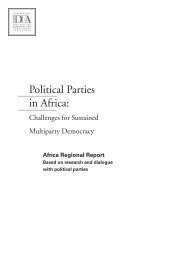Background Document - Danish Institute for Parties and Democracy
Background Document - Danish Institute for Parties and Democracy
Background Document - Danish Institute for Parties and Democracy
You also want an ePaper? Increase the reach of your titles
YUMPU automatically turns print PDFs into web optimized ePapers that Google loves.
Trainings by NGOs, political parties, educational <strong>and</strong> political institutions are imperative<br />
in order to secure greater participation of women in local politics to develop<br />
their skills self confidence, gender awareness rights <strong>and</strong> also <strong>for</strong> political leadership.<br />
CONCLUSION<br />
We began by emphasizing the importance of local politics at a time when the discourses<br />
on deepening democracy are gaining importance including that of deliberative democracy<br />
that celebrates debate <strong>and</strong> discussion on matters of policy rather than this<br />
being taken up exclusively by elected legislators. If such practices are indeed gaining<br />
ground, the role of women in local politics cannot be overstated.<br />
Since their experiences are different from that of men they bring in new perspectives<br />
<strong>and</strong> new ideas, <strong>and</strong> to ignore this or bypass it would defeat the very purpose of<br />
such a decentralisation process associated with deepening democracy.<br />
Whether it is in the countries that are held out as exemplars of women’s political<br />
participation such as the Sc<strong>and</strong>inavian countries or states in Africa <strong>and</strong> South Asia<br />
where the hold of patriarchy is palpably more, the phenomena still exists across the<br />
world. This mindset produces a certain sexual division of labor in the household <strong>and</strong><br />
corresponding gendered institutions <strong>and</strong> ideologies that militate against women participating<br />
in local politics.<br />
These are the barriers that need to be identified <strong>and</strong> removed. This is why the<br />
South Asian resolution around the issue of violence against women in politics concludes:<br />
“We, the people of South Asia, both women <strong>and</strong> men, collectively challenge patriarchy<br />
<strong>and</strong> seek to replace it with a culture that actively supports equal participation<br />
of all. We encourage a South Asian <strong>for</strong>um that promotes such culture <strong>and</strong><br />
values through mass communication.”<br />
This will be as true in different degrees <strong>for</strong> the rest of the world as it is <strong>for</strong> South<br />
Asia.<br />
BIBLIOGRAPHY<br />
Brownhill, Sue <strong>and</strong> Susan Hal<strong>for</strong>d. “Underst<strong>and</strong>ing women’s involvement in local politics.” Political Geography,<br />
vol. 9(1990):4, 396-414.<br />
Chabal, Patrick <strong>and</strong> Jean-Pascal Daloz. Africa Works. Disorder as political instrument. Ox<strong>for</strong>d <strong>and</strong><br />
Bloomington: James Currey <strong>and</strong> Indiana University Press, 1999.<br />
“Comparative study Women in Local Government in Asia <strong>and</strong> the Pacific.” http://www.unescap.org/<br />
huset/women/reports/comparative_report.pdf<br />
DasGupta, Sumona. Citizen Initiatives <strong>and</strong> Democratic Engagement: Experiences from India. New Delhi<br />
<strong>and</strong> Abingdon : Routledge, 2010.<br />
Drage, Jean. Women in local Government in Asia <strong>and</strong> the Pacific, Paper presented to the Asia-Pacific<br />
Summit of Women Mayors <strong>and</strong> Councillors, 2001<br />
http://www.unescap.org/huset/women/summit/substantive_overview/jean_drage_speech_text.htm<br />
Encyclopaedia of Life Support Systems (EOLSS). Niikawa, Tatsuro. “Decentralization <strong>and</strong> Local Politics.”<br />
http://www.eolss.net/Sample-Chapters/C04/E6-32-03-05.pdf<br />
Farrell, Martha <strong>and</strong> M<strong>and</strong>akini Pant. “Women’s Political Empowerment <strong>and</strong> Leadership: Pedagogical<br />
Challenges.” Participation <strong>and</strong> Governance. vol 2 (July 2009): 42-56.<br />
Francis, Anne. (not dated) “Why women Succeed in local politics.” http://www.snvworld.org/sites/www.<br />
snvworld.org/files/publications/snv_series_03_tanzania_women_politics_leadership.pdf<br />
Kalpagam, U. <strong>and</strong> Jaya Arunachalam. (ed.) Development <strong>and</strong> Empowerment: Rural Women in India.<br />
WOMEN IN POLITICS DANISH INSTITUTE FOR PARTIES AND DEMOCRACY PAGE 34
















